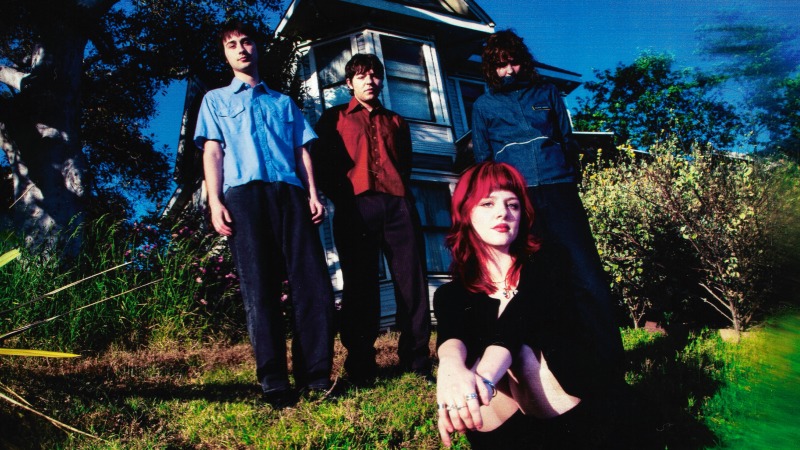Rocket: The Best of What’s Next
RIYL: The Smashing Pumpkins, Sonic Youth, Lush, The Brian Jonestown Massacre
Photo by Jaxon Whittington
If you can imagine Sonic Youth writing songs for the pop charts, then you can imagine why I’m absolutely buzzing about the band Rocket. Their debut EP, Versions of You, was a gas in 2023, an especially tall feat, considering the bite-sized bangers we got that year from Angel Olsen, NewJeans, Yaya Bey, and Geese. Rocket’s debut record, R is for Rocket (a nod to the nineties band Radio Flyer), is an expansive upscaling of Versions of You’s pop bombast and guitar language. Recorded at 64 Sound and the Foo Fighters’ Studio 606—a far-cry from the limited-resource, backhouse production of the EP—in SoCal, the noise and the hooks are still big-time, but there’s a nice wash of piano, Farfisa organ, mellotron, and drum machine threaded throughout, flashing the band’s obsession with Siamese Dream’s overdrive while flaunting the softer accents of a Beach Boys and Brian Jonestown Massacre’s influence.
Alithea Tuttle, Baron Rinzler, Cooper Ladomade, and Desi Scaglione formed Rocket in Los Angeles two years earlier, in an “excuse to hang out and do something fun together.” For everyone but Scaglione, it’s their first band ever. Their earliest practices together took place in a “shitty little practice space,” as Rinzler puts it, in Hollywood off Selma and Highland. At the beginning, Tuttle, whose dreams of becoming a dancer were quelled by a spinal injury in 2016, was learning how to play bass, which she calls the “best and scariest” atmosphere to be in. “It’s like when you say a word wrong in front of your friends, you know that one of them is going to say it back to you,” she elaborates. “But I don’t think I would have been able to learn as quickly without it being my friends. I would have been too scared.” The energy in the room then, she says, was always inviting and comfortable.
And, considering Tuttle’s bandmates’ extensive histories with their instruments (Rinzler has been playing guitar since he was ten, Scaglione’s dad is a musician, and Ladomade started playing drums in hers and Tuttle’s middle school’s jazz band), she felt especially encouraged to not be Rocket’s weak link. “It’s easier, when you’re playing with people that are already good, because the odds that you are all going to sound good together are higher than if you’re all learning.” Despite the foursome’s collective friendship dating back to childhood, Tuttle and her bandmates took everything slowly and on the chin. “It was challenging, because it was like, ‘In order to know if we can do this or not, we need to know if we can play,’” Tuttle remembers. “Like, ‘If we don’t sound good together, then this is over.’ It was definitely nerve-wracking.” Scaglione, Tuttle’s partner since high school, echoes her recollection. “We didn’t want to jump the gun,” he says. “Getting together every day, we were like, ‘Okay, we’re going to do this until it’s good and, then, once it’s good, we can start telling people about it.’”
Tuttle didn’t sing during Rocket’s first six months of existence, despite the band rehearsing every day. “I could not do it for the life of me. Then, we got our first show and everyone said, ‘Look, we know it’s scary, but you have to do this, or else we’re screwed.’” I ask if she was writing songs at that point. “We had a bunch of songs that we were going to play for our first show. [My bandmates] heard the demos where I was singing. I could sing, but I couldn’t do it in person.” But Tuttle did sing, eventually, at Rocket’s first show, which occurred at El Cid on Sunset, opening for MILLY and a band called Crisman (now known as Teethe). “We got asked to play four months before the show,” Scaglione says. “Our friend, who was one of the only friends we had shared this info with, that we had music, was like, ‘You need to play your first show with our band!’”
“We were like, ‘Thank God you want us to play with you,’” Tuttle hollers. “It’s that thing of, like, how do you get your first job if no one will hire you because you haven’t had a job?”
“And [MILLY] very much are still a part of the LA music scene,” Scaglione adds. “I think, because we played our first show with them, other people booking bands were like, ‘Oh, this band played with them, you guys should come play with us,’ which made it very easy to get shows in the beginning.”
But there was one issue leading up to the MILLY gig: Rocket didn’t have a name. “At a certain point,” Scaglione reveals, “[MILLY] would say, ‘Yo, do you have a name? We need to announce the show. We need to make the flyer.’ And we’d be like, ‘No.’” Time was running out and, a month before the show, Tuttle, Rinzler, Ladomade, and Scaglione decided on “Rocket.”
“It’s an easy name to remember,” I say. “What got you there?”
“I was apparently doodling and I drew a rocket,” Tuttle says. “We were up late at our rehearsal space, being like, ‘What are we going to name this band?’ We had so many bad names in this hat, and we were so embarrassed to say them out loud. Then I was doodling, and Baron was like, ‘What about “Rocket”?’ And we were all like, ‘That’s not half bad, because we can actually say it out loud.’”
I push back, hoping to get some inkling as to what names are too wretched to repeat.
-

-

-

-

-

-

-

-

-

-

-

-

-

-

-

-

-

-

-

-

-

-

-

-

-

-

-

-

-

-

-

-

-

-

-

-

-

-

-

-








































